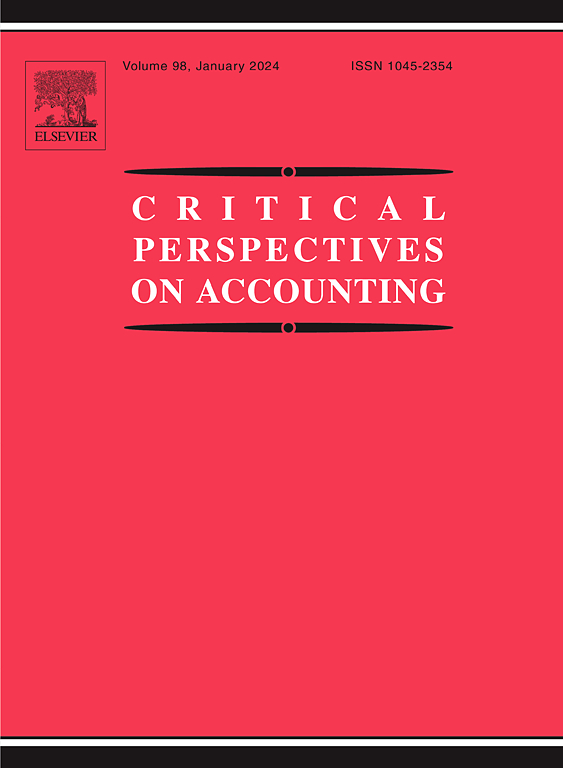面对黑暗学术界:一种接受与抵抗的斯多葛策略
IF 5.7
2区 管理学
Q1 BUSINESS, FINANCE
引用次数: 0
摘要
新自由主义对大学的吞并导致了“黑暗学术界”,这是一种与压力、焦虑、疲惫、内疚、恐惧和倦怠相关的状态。会计的专业承诺和狭隘的教学使我们的学科尤其受到谴责。虽然先前的研究倾向于描述黑暗学术界的原因(新自由主义)和影响(有害的心理健康),但我主张对其本质进行细致入微的新颖描述。具体来说,我识别并描述了它的五个“价值”,即个人主义、幻觉、不平等、同构和无限。然后,我将讨论如何运用斯多葛哲学来对抗这些价值观。具体地说,在自我民族志的传统中,我调动了马可·奥勒留的《沉思录》,展示了学者是如何接受和抵制黑暗学术界的价值观的。我还通过研究斯多葛主义如何能够现实地、亲社会地造福学术界,挑战先前将斯多葛主义概念化为一种不切实际的、以自我为中心的哲学。这项研究可能对我们社区的边缘成员特别及时,比如初级教师和博士生。它阐明了斯多葛哲学在更好地理解和面对个人和社区危机方面尚未开发的潜力。本文章由计算机程序翻译,如有差异,请以英文原文为准。
Confronting dark academia: A Stoic strategy of acceptance and resistance
Neoliberal annexation of universities results in ‘dark academia’, a state associated with stress, anxiety, exhaustion, guilt, fear and burnout. Accounting’s professional commitments and narrow teaching render our discipline especially culpable. Although prior research tends to describe the cause (neoliberalism) and effect (deleterious mental health) of dark academia, I argue for a nuanced and novel characterization of its nature. Specifically, I identify and describe its five ‘values’, namely individualism, illusion, inequality, isomorphism and infinitude. I then argue how Stoic philosophy can be deployed to confront these values. Specifically, in the autoethnographic tradition and mobilizing the Meditations of Marcus Aurelius, I show how academics can accept and yet also resist dark academia’s values. I also challenge prior conceptualization of Stoicism as an impractical and self-centered philosophy by examining how it can realistically and pro-socially benefit the academic community in general. This research may be especially timely for marginalized members of our community, such as junior faculty and PhD students. It illuminates the untapped potential of Stoic philosophy to better understand and confront individual and community crises.
求助全文
通过发布文献求助,成功后即可免费获取论文全文。
去求助
来源期刊

Critical Perspectives on Accounting
BUSINESS, FINANCE-
CiteScore
9.40
自引率
7.80%
发文量
91
期刊介绍:
Critical Perspectives on Accounting aims to provide a forum for the growing number of accounting researchers and practitioners who realize that conventional theory and practice is ill-suited to the challenges of the modern environment, and that accounting practices and corporate behavior are inextricably connected with many allocative, distributive, social, and ecological problems of our era. From such concerns, a new literature is emerging that seeks to reformulate corporate, social, and political activity, and the theoretical and practical means by which we apprehend and affect that activity. Research Areas Include: • Studies involving the political economy of accounting, critical accounting, radical accounting, and accounting''s implication in the exercise of power • Financial accounting''s role in the processes of international capital formation, including its impact on stock market stability and international banking activities • Management accounting''s role in organizing the labor process • The relationship between accounting and the state in various social formations • Studies of accounting''s historical role, as a means of "remembering" the subject''s social and conflictual character • The role of accounting in establishing "real" democracy at work and other domains of life • Accounting''s adjudicative function in international exchanges, such as that of the Third World debt • Antagonisms between the social and private character of accounting, such as conflicts of interest in the audit process • The identification of new constituencies for radical and critical accounting information • Accounting''s involvement in gender and class conflicts in the workplace • The interplay between accounting, social conflict, industrialization, bureaucracy, and technocracy • Reappraisals of the role of accounting as a science and technology • Critical reviews of "useful" scientific knowledge about organizations
 求助内容:
求助内容: 应助结果提醒方式:
应助结果提醒方式:


